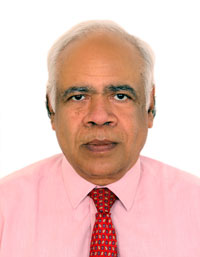
Professor T.S Ganesan
MD, MNAMS, PhD (Lon), FRCP
Professor, Medical Oncology Head,
Cancer Biology Laboratory
Email: [email protected]
Dr. T.S.Ganesan graduated 'Summa cum Laude' from Jawaharlal Institute of Medical Education and Research, Pondicherry, India and completed his MBBS and MD in Internal medicine followed by Senior Residency. He completed his training in Medical Oncology at St. Bartholomew's Hospital, London. His doctorate on Philadelphia chromosome positive leukemias was awarded by the University of London. He was subsequently appointed as Consultant Medical Oncologist at Churchill Hospital, Oxford and established a laboratory as Clinical Scientist and Reader at the Weatherall Institute of Molecular Medicine, Oxford. After 15 years at Oxford he was appointed as Chairman, Cancer Institute and Institute of Molecular Medicine at Amrita Institute of Medical Sciences, Cochin, India in 2006. He subsequently moved to Cancer Institute Adyar in 2012 and is Professor of Medical Oncology and Head of Clinical Research. He has established a laboratory of cancer biology. His research interests have been on cancer genetics and signal transduction, in addition to early clinical trials. The research in UK was supported initially by the Imperial Cancer Research Fund and subsequently by Cancer Research UK. In India, the research is supported by Department of Biotechnology and Indian Council of Medical Research. He has been awarded the Clinical Excellence award in UK during his tenure there. He has over 170 papers to his credit in international journals.
He has trained residents in Medical Oncology in UK and subsequently in India. He has also been instrumental in supervising graduate students in UK and India. He has over 38 years of experience in Oncology. He has been in national committees such as MRC, CRUK in the UK and ICMR, DBT in India.
BIOGRAPHY
Prof T S Ganesan graduated from JIPMER, India, and subsequently trained in medical oncology at St.Bartholomew’s Hospital. He completed his PhD from the University of London. He was appointed as ICRF/CRUK Senior Clinical Scientist at The Weatherall Institute of Molecular Medicine, Reader at Oxford University, and Consultant Medical Oncologist at the ICRF/CRUK Medical Oncology Unit, Churchill Hospital (1990-2005) at Oxford. In India, he was appointed as Chairman of the Cancer Institute and Institute of Molecular Medicine (2005-2012) at Amrita Institute of Medical Science and Research, Kochi, Kerala. He joined Cancer Institute (WIA) as Professor in Medical Oncology from 2012. In addition to his own scientific interests, he was responsible for clinical research at the institute.
SOURCES OF FUNDING
- Department of Biotechnology
- Department of Science & Technology
- Indian Council for Medical Research
- University Grants Commission
RESEARCH SUMMARY
First, the studies of cancer stem cells is to understand how cancer develops in general. The aim is to identify and characterize these cancer stem cells and study their properties. If the cancer stem cell hypothesis is correct then targeting these cells will be very important for the management of patients with cancer. We have focused on serous ovarian cancer for a comprehensive analysis of cancer stem cells.
The second area of research is to try and understand signaling pathways, which are commonly affected in cancer. Usually, cells are stimulated by signaling through receptors which are on the surface of the cells. These are increased in expression or amplified at the gene level in cancer. This has led to the discovery of specific small molecule inhibitors which target type I and type III receptors tyrosine kinases. We have chosen a mass spectrometry based approach and identified several novel phosphoproteins in the ErbB2 signaling pathway
The third area of research is to identify oncogenes and tumour suppressor genes important in the pathogenesis of ovarian cancer. We have identified by a novel bioinformatics approach RNF144B and PPP2R2A and are identifying their role in ovarian cancer.
LAB MEMBERS
P.MANASA (INSPIRE FELLOW)
DR.SHABNA. A (DST-WOSA)
DR.N.V.VANI (DBT/ Wellcome Trust
India Alliance)
MADHANAGOPAL R (Scientific
Assistant)
SELECTED PUBLICATIONS
Development and invitro characterisation of an induced pluripotent stem cell model of ovarian cancer. S. Bindhya. et al, (2021), Int J Biochem Cell Biol, (In Press)
Oncogenes in high grade serous adenocarcinoma of the ovary. Pacharla Manasa. et al, (2020), Genes Cancer, 11, 122-136
The hedgehog pathway regulates cancer stem cells in serous adenocarcinoma of the ovary. Smarakan Sneha. et al, (2020), Cell Oncol, 43, 601-616.
ALDH1A1+ ovarian cancer stem cells co-expressing surface markers CD24, EPHA1 and CD9 form tumours in vivo. Rohit P Nagare. et al, (2020), Exp Cell Res, 392.
Cancer stem cells contribute to angiogenesis and lymphangiogenesis in serous adenocarcinoma of the ovary. Syama Krishnapriya. et al, (2019), Angiogenesis, 22, 441-455.
Induced Pluripotent Stem Cells: A New Strategy to Model Human Cancer. Bindhya S. et al, (2019), Int J Biochem Cell Biol, 107,62-68.
A systematic understanding of signaling by ErbB2 in cancer using phosphoproteomics. C.Sidhanth. et al, (2018), Biochem Cell Biol, 96, 295- 305.
Therapeutic antibodies against cancer stem cells: a promising approach. Smarakan Sneha. et al, (2017), Cancer Immunol Immunother, 66, 1383-1398




